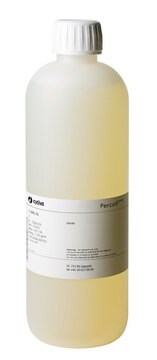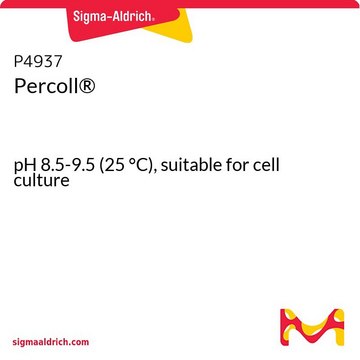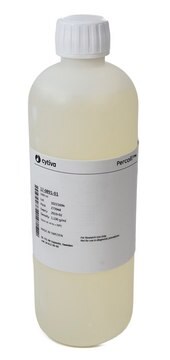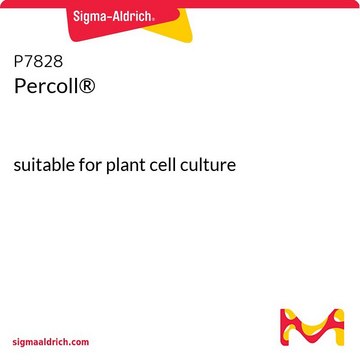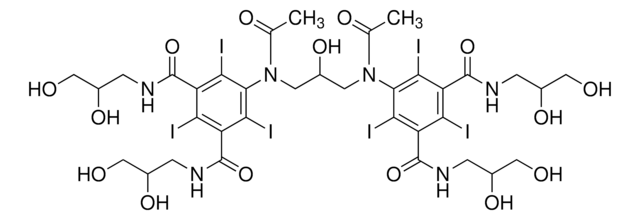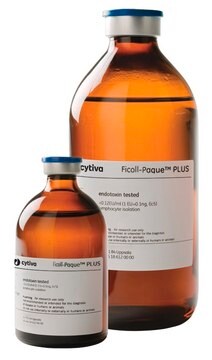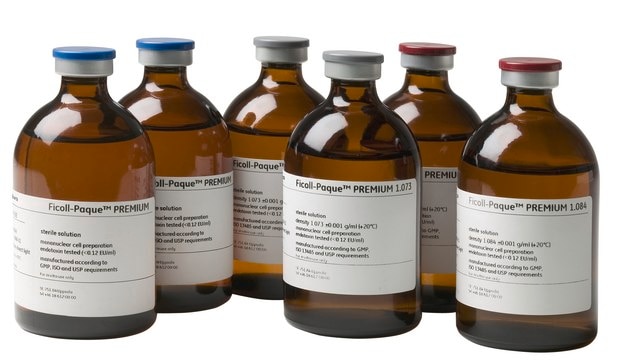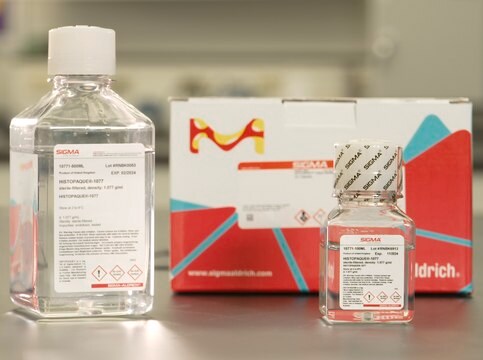GE17-0891-02
Percoll®
Cytiva 17-0891-02, pack of 250 mL
Sinônimo(s):
Percoll Density Gradient Media
About This Item
Produtos recomendados
Formulário
colloidal (Colloidal solution of silica coated with polyvinylpyrrolidone (PVP))
liquid (Suspension)
solution
embalagem
pack of 250 mL
fabricante/nome comercial
Cytiva 17-0891-02
técnica(s)
cell culture | mammalian: suitable
cor
Colorless to slightly yellow
faixa de pH
8.5-9.5
temperatura de armazenamento
2-8°C
Categorias relacionadas
Descrição geral
Percoll® is a low viscosity density gradient medium for preparation of cells, subcellular particles, and larger viruses. The low viscosity of the medium enables cell preparation on preformed gradients in only a few minutes using low centrifugal forces (200 to 1000 × g). The medium is available in easy-to-open, resealable 250 mL and 1 l bottles.
Percoll® consists of silica particles (15 to 30 nm diameter) coated with non-dialyzable polyvinylpyrrolidone (PVP). Free PVP is present at only 1% to 2%. Percoll® is non-toxic, almost chemically inert and does not adhere to membranes. Percoll® gradients can be formed within the density range of 1.0 to 1.3 g/mL, and are iso-osmotic throughout.
Percoll® can be stored unopened at room temperature for five years. At -20° C, it can only be stored for up to six months. If stored at -20° C, gradients form upon thawing, necessitating a mixing of the bottle before use. Preformed gradients can be stored for weeks without a change in gradient shape, provided that the gradient remains unfrozen. Percoll® can be buffered within the pH range 5.5 to 10.0 without any changes in properties. If the pH is dropped below 5.5, gelling may occur. Gelling can also be caused by the presence of divalent cations, an effect which is exacerbated by elevated temperatures.
Aplicação
Características e benefícios
- For separation of cells, subcellular particles and larger viruses (down to ~ 70S) under gentle conditions which preserve viability and morphological integrity.
- Non-toxic to cells.
- Adjustable to physiological ionic strength and pH.
- Gradients can either be preformed or spontaneously generated by centrifugation at moderate speeds in an angle-head rotor.
- Gradients are iso-osmotic throughout and cover a range of densities up to 1.3 g/mL.
Armazenamento e estabilidade
Nota de análise
Informações legais
Código de classe de armazenamento
12 - Non Combustible Liquids
Classe de risco de água (WGK)
WGK 3
Ponto de fulgor (°F)
Not applicable
Ponto de fulgor (°C)
Not applicable
Escolha uma das versões mais recentes:
Certificados de análise (COA)
It looks like we've run into a problem, but you can still download Certificates of Analysis from our Documentos section.
Se precisar de ajuda, entre em contato Atendimento ao cliente
Já possui este produto?
Encontre a documentação dos produtos que você adquiriu recentemente na biblioteca de documentos.
Os clientes também visualizaram
Nossa equipe de cientistas tem experiência em todas as áreas de pesquisa, incluindo Life Sciences, ciência de materiais, síntese química, cromatografia, química analítica e muitas outras.
Entre em contato com a assistência técnica